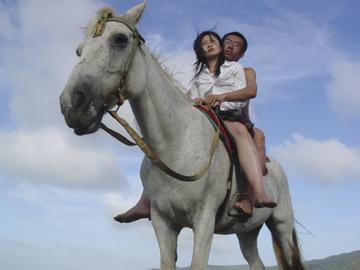Yang Fudong
dal 20/2/2005 al 15/5/2005
Segnalato da
20/2/2005
Yang Fudong
Kunsthalle Wien, Wien
Don't worry, it will be better... an exhibition of the photography, film and video productions. The characters in Fudong's films attempt a balancing act between an inner life that bears the stamp of Buddhism and Confucianism, a cultural memory appropriated by communism and the frenetic pace of modern capitalism.

Don't worry, it will be better...
In the films of the Chinese artist Yang Fudong, scenarios from ostensibly pulsating urban environments whose facades conceal the growing extension of solitude, emptiness and cultivated boredom are entwined with images of remote countryside and meditative silence. Displaced elements in the Chinese tradition mingle with rootless western influences into an amalgam of affection, melancholy and parody. Yang Fudong’s films document the traces of China’s vertiginous political, economic and cultural development, oscillating between intimacy and isolation, ostensible security and the calm of chaos.
The characters in Yang Fudong’s films attempt a balancing act between an inner life that bears the stamp of Buddhism and Confucianism, a cultural memory appropriated by communism and the frenetic pace of modern capitalism. Yang Fudong infiltrates the factures between these worlds in an attempt to accentuate and simultaneously reconcile these contradictions with poetry and burlesque/comic elements. In both the form and content of his work, Yang Fudong leads us back into the past and its traditions of Zen, martial arts and the aesthetic disciplines of poetry, painting and calligraphy. These he fades into the current fate of disorientated, isolated individuals who struggle for their dignity in an environment marked by repression, the illusion of beauty and the shrill surface of mercantile utilitarianism.
For the first time Kunsthalle Wien dedicates an exhibition to the photography, film and video productions of Yang Fudong. Among the works shown are City Lights (2000), Backyard. Hey! Sun is Rising (2000), Flutter, Flutter … Jasmin, Jasmin (2002), Closed to the Sea (2004) and the second episode of the planned five-part Seven Intellectuals in Bamboo Forest, part 1 (2003) and part 2 (2004).
In Seven Intellectuals in Bamboo Forest, a group of young intellectuals and artists, in the manner of the legendary wise men of the 3rd Century BC, withdraw to the solitude of the woods in order to reflect on the state of contemporary culture. Having rejected the corrupt world of their regime, the wise men instead dedicate themselves entirely to contemplation and an ideal life. Yang Fudong’s young Chinese intellectuals however repair to the holy mountain of Huangshan to bathe in the mysticism and silence of an enchanted natural idyll and reflect on their position within a world dominated by the pressure to adapt to capitalism. In the second part, the same group is transposed to an urban environment and where they contemplate the utopia of an authentic life.
Born in Beijing in 1971, works by Yang Fudong were shown at the Documenta 11 in 2002 and at the 50th Venice Biennale (Chinese Pavilion and ‘Utopia Station’) in 2003. In February 2004, the Museum of Modern Art in New York showed three of his films and, in the same month, he was nominated for the 2004 Hugo Boss Prize.
Curators: Sabine Folie, Gerald Matt
Image: Close to the sea, 2004
Press conference: Monday, February 21, 2005, 10 am
Opening: Monday, February 21, 2005, 7 pm
KUNSTHALLE wien - Museumsplatz 1 - Vienna
daily 10 a.m. – 7 p.m., Thu 10 a.m. – 10 p.m., Wed closed



